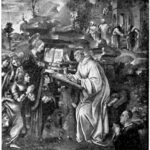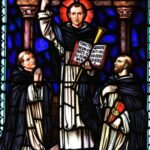St. Matthew
St. Matthew
When They Lived:
St. Matthew, also known as Levi, is believed to have lived during the 1st century AD. The exact dates of his birth and death are not definitively known, but it is widely accepted that he lived in the early decades of that century.
Where They Lived:
St. Matthew’s life was centered around Capernaum, a bustling fishing village located on the northern shore of the Sea of Galilee in ancient Israel. This region was a crossroads of cultures and trade, making it a melting pot of various influences.
Notable World Events During the Time of Their Life:
- The Roman Empire’s Expansion: St. Matthew’s lifetime coincided with the height of the Roman Empire’s expansion, marked by Emperor Augustus’ reign. The Roman Empire’s far-reaching influence had a profound impact on the cultures and societies of the time.
- The Birth of Jesus Christ: A pivotal event in history, the birth of Jesus Christ is said to have occurred during St. Matthew’s lifetime. While not directly related to St. Matthew’s patronage, this event had a profound impact on Christianity and the world’s cultural and religious landscape.
- The Destruction of the Second Temple: In 70 AD, the Second Temple in Jerusalem was destroyed by the Romans under Emperor Titus. This event marked a significant turning point in Jewish history and had far-reaching repercussions for religious practices and beliefs.
- Ptolemaic Influence in Egypt: During St. Matthew’s time, the Ptolemaic Kingdom in Egypt was transitioning into Roman control. This change in power had implications for trade, culture, and knowledge exchange throughout the Mediterranean region.
- The Development of Roman Law: St. Matthew’s era witnessed the growth and refinement of Roman legal systems, which would later play a crucial role in shaping modern legal frameworks. This development had implications beyond the confines of religion and directly affected the lives of individuals.
Their Patronage:
St. Matthew is revered as the patron saint of accountants, tax collectors, bankers, and customs officers. His association with these professions stems from his own background as a tax collector before he answered the call to become one of Jesus’ twelve apostles. St. Matthew’s transformation from a tax collector to an apostle symbolizes redemption and a change of heart. His story serves as a reminder that
One of the Chosen Twelve
Just like in the case of his fellow Apostles, it is almost impossible to make a complete biography of Matthew because the details of his life are scarce and fragmentary. But the Gospels as well as other non-canonical sources tell us some information about him. Matthew’s name always appears in the lists of the Twelve chosen by Jesus, in Matthew 10:3, Mark 3:18, Luke 6:15, and Acts 1:13. These verses verify that he was indeed one of the Twelve chosen Apostles.
According to their appearance in the Bible, the first gospel goes under his name. The Gospel of Matthew presents Matthew in the list of Twelve with a very precise label: “the tax collector” (Matthew 10:3). Hence, Matthew is identified with the man sitting at the tax office whom Jesus called to follow him: “As Jesus passed on from there, he saw a man named Matthew sitting at the customs post. He said to him, ‘Follow me, And he got up and followed him.” (Matthew 9:9). The Gospels of Mark and Luke also tell of the calling of a man sitting at the tax office who was named “Levi” (see Mark 2:13–17 and Luke 5:27–30).
Despised by Men, Called by Jesus
As his post demanded of him, Matthew collected the taxes that the Jews, his own people, had to pay to the Roman government. As such, he was despised by people because he was considered to be in allegiance with the oppressors. He had probably become used to it, but the day he was called by Jesus changed his life. Luke described what happened after Levi, or Matthew, left his post to follow Jesus: “Then Levi gave a great banquet for him in his house, and a large crowd of tax collectors and others were at the table with them. The Pharisees and their scribes complained to his disciples, saying, ‘Why do you eat and drink with tax collectors and sinners?’ Jesus said to them in reply, ‘Those who are healthy do not need a physician, but the sick do. I have not come to call the righteous to repentance, but sinners.’” (Luke 5:29-32)
Matthew’s Mission
Matthew wrote his version of the Jesus story primarily for the Jewish people who had become followers of Christ. He wanted his audience to know that Jesus was indeed the promised Messiah, the Savior of all people. His Gospel makes clear that Jesus was the fulfillment of all the Old Testament prophecies. In Matthew’s Gospel, we could also see the Eight Beatitudes, which serve as the “magna carta” of the Christian life.
After the Ascension of Jesus, empowered by the Holy Spirit on Pentecost, Matthew preached the Good News in obedience to Christ’s commission, found in the concluding chapter of Matthew’s Gospel: “Go, therefore, and make disciples of all nations, baptizing them in the name of the Father, and of the Son, and of the Holy Spirit, teaching them to observe all that I have commanded you. And behold, I am with you always, until the end of the age.” (Matthew 28:19-20)
It is believed that Matthew reached Ethiopia and other parts of Africa. He established Christian communities there and preached the Gospel. Some sources say that he died a natural death, while others say he was martyred—stabbed to death in particular—in Ethiopia. His feast day is celebrated on September 21.
Five Interesting Facts About St. Matthew
- St. Matthew is the patron saint of bankers and bookkeepers.
- St. Matthew’s name in Greek Ματθαῖος (Matthaios) or Hebrew [וּהיָ תְתִּמ], (Mattityahu), means “gift of Yahweh”.
- St. Matthew is recognized as a saint by several churches other than the Roman Catholic Church, such as the Lutheran, Anglican, and Eastern Orthodox churches, among others.
- The Gospel of Matthew is symbolized by the divine man or a winged man (reminiscent of the vision of the prophet Ezekiel and the four living creatures in Revelation) because the Gospel highlights Jesus’ entry into this world, His lineage, Incarnation, and birth. It is, according to St. Irenaeus, the “Gospel of His humanity”.
- Among the four Gospels, Matthew’s version is the only one that mentions the visit of the magi to the Child Jesus.
Prayer to St. Matthew
O God, who with untold mercy was pleased to choose as an Apostle Saint Matthew, the tax collector, grant that, sustained by his example and intercession, we may merit to hold firm in following you. Through our Lord Jesus Christ, your Son, who lives and reigns with you in the unity of the Holy Spirit, one God, for ever and ever Amen.



